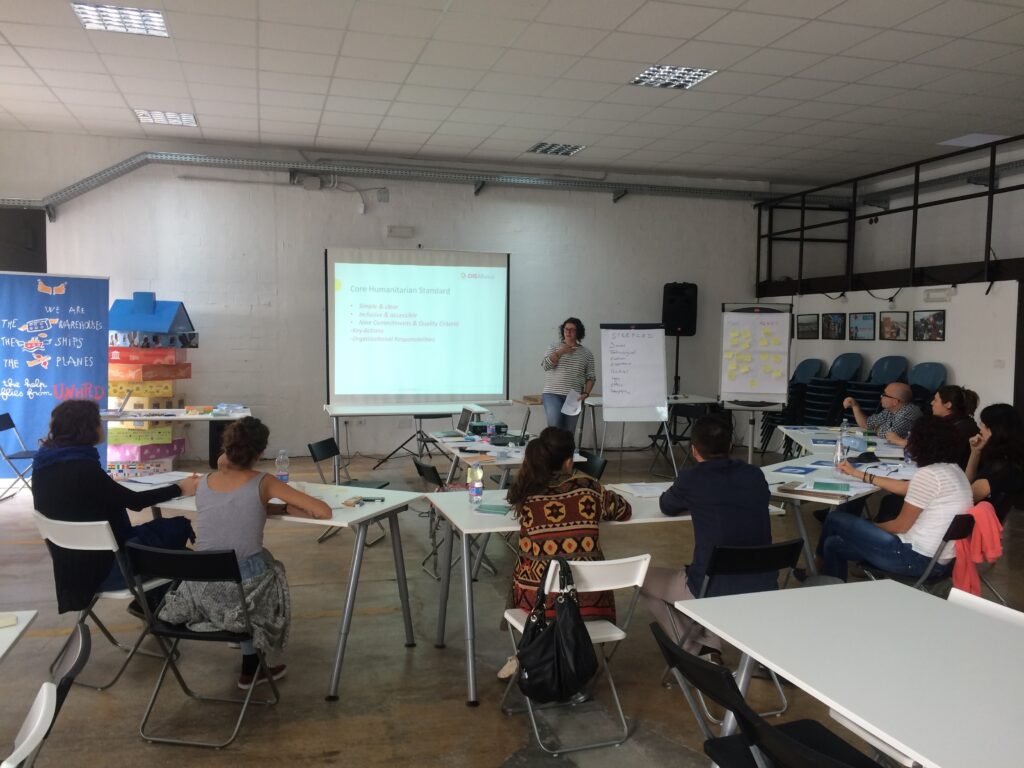Emmanuelle Lacroix | 13th October 2015
Braving the rain at 7am to attend a workshop using role-play to illustrate the skills and behaviours required to handle conflict in the workplace, I wondered if it was such a great idea: would I have to take an active part part in role-playing when all I was wanted at the time was a giant cup of coffee to warm me up! Once I got there, I soon remembered that our colleagues at CiC (http://www.cic-eap.co.uk/) know all about stress management and defusing fear and knew the workshop would be enjoyable as well as informative!
This workshop was facilitated by role-play actors: people who know what they are doing and actually enjoy acting (whilst also doing it very well!). Although we were not participating in role plays ourselves, the workshop was still very participatory and active. We embarked on a very dynamic and captivating journey to explore the skills and behaviours needed to build emotional resilience to help us to defuse conflict in the workplace. The use of role play really helped participants get into the scenario, connect with our own experiences and emotions to reflect on what we would and should when facing such situations.
Most – if not all – of us have had to deal with tricky situations at work, and might have let our emotions prevent a quick and effective resolution. Changes and uncertainty are a given features in our sector, and beyond, and often lead to stress and tension. When under pressure to respond to emergency situations or deliver under tight donor deadlines and requirements or moving goal posts, it is easy for managers to push their action plans forward, leaving collaboration and participatory approaches to a later time.
It is no breaking news to state that these are the perfect factors to create misunderstanding, tension and team fragmentation, which can ultimately lead to conflict. So what can you do to defuse the tension, manage conflict effectively and in the process empower your team and yourself in the process?
Some of the tips I took away from the workshop that I would like to share with the HOPE Master students of ASVI School of Management (http://www.socialchangeschool.org/) are:
*Know what motivates and engages your staff
By that, I also mean getting to understand the team dynamics and interdependencies, the individual work profiles (e.g. is there someone in your team who applied for your role that could be resentful?), the preferences and the no-go in terms of the managerial tools (e.g. suggesting a team Friday drink after work or a team building event over the weekend might not work for everybody or every context).
You have been put in charge of the team based on your expertise and competencies but if you don’t get your team engaged, you will not be able to apply these skills and competences. Get the intelligence; identify the skills, expertise and interests in your team.
*Listen – really listen – and be there when you do
When you join or take over management responsibility for a team, start by listening and get to know people individually as much as possible. Create enough space for absorption as part of your on-boarding period. Then you can move to collaborative and informed planning and delivery.
Acute listening can be tiring, when done genuinely, so acknowledge this and carve the right amount of time in your days for it.
*Take your responsibilities as leader but remain humble
If facing resistance or conflict from members of your team, you have to make the difference between raw emotions and constructive feedback. Be confident and humble, show empathy (especially when trying to defuse tension or aggression, and your body language needs to reflect your spoken words) and acknowledge your fears. All this and more relate to emotional intelligence which we explored back in March with CiC: http://www.peopleinaid.org/resources/stress-of-leadership.
The workshop facilitator shared a great coaching question to help create some self-awareness: reverse the role and ask yourself how you would manage you in this situation?
*Good leadership is not about “know-it-all”
Some of your team members have more experience than you on some sides of your programmes? Good, this is why they were hired – you are here to set the scene, provide strategic vision and ensure the knowledge hold within your team serve the purpose and mission of the organisation. Don’t hesitate to tell your team you also want to learn from them and then be deliberate about creating opportunities to make that happen.
*Empowerment comes from taking control
If the situation is deteriorating, take control of the environment and allow the individual(s) to do so too so ownership of the resolution process is shared. Don’t avoid the issue hoping for it to pass, don’t let it spread within the team further and be intentional when communicating about it. Identify and agree on actions that provide quick wins to address the situation.
If the situation requires external mediation or support, then reach out for it, may it be via your line manager, your Human Resources team or other support mechanisms available within our organisation.
These are just a few tips to add to your personal tool kit as manager as you go on to build your career and profile.


